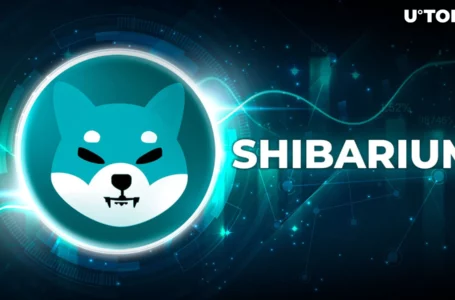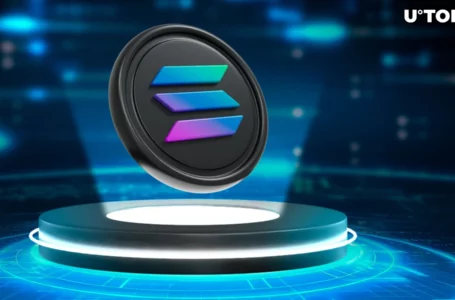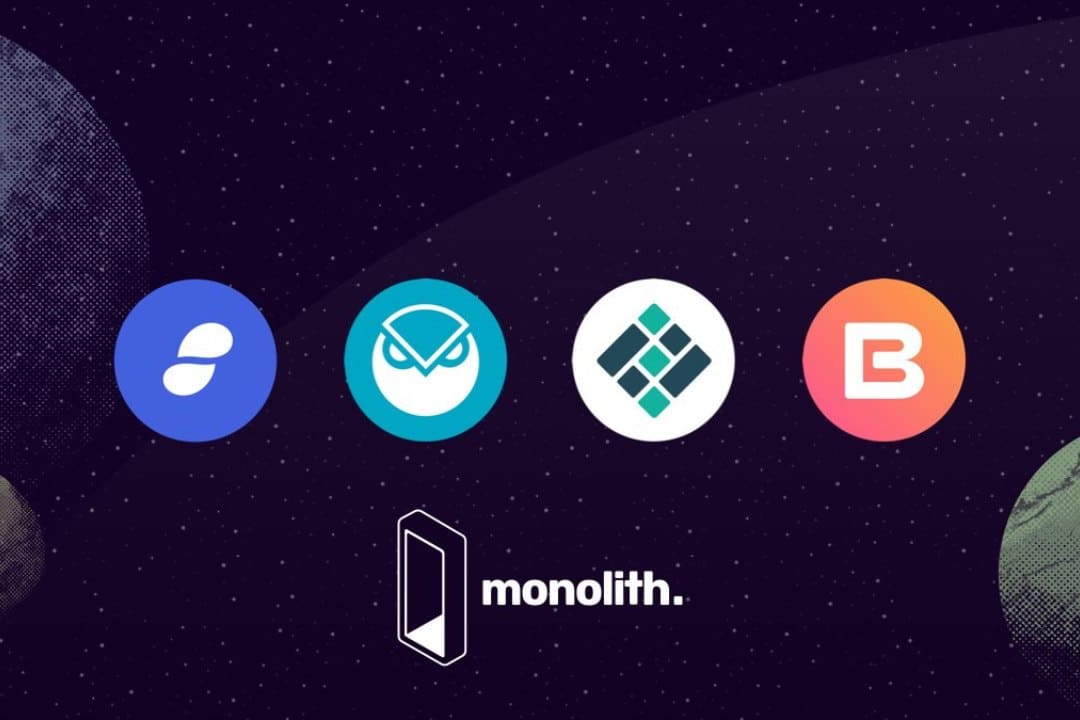
Today we’re going to take a more in-depth look at the Monolith card: its features, how it works and the fees it charges. We’ll also look at the wider Monolith ecosystem and give you some essential background to the platform itself. All this should help give you a clear idea of whether or not the Monolith card is something you should consider adding to your wallet.
The Company
Monolith is the trading name of Token Group Limited, which was incorporated back in 2017. It was founded by Mel Gelderman and David Hoggard, who still serve as CEO and strategy director respectively.
Gelderman is an entrepreneur with a background in the cryptocurrency and biofuels sectors, while Hoggard studied mathematics at Newcastle University in the UK. Monolith was formerly known as TokenCard until a rebrand back in 2019.
The name Monolith is inspired by the mysterious column that appears in Stanley Kubrick’s film ‘2001: A Space Odyssey’. So if you’re wondering why some of the Monolith staff on the company’s ‘Team’ page are pictured posing with a copy of the Arthur C Clarke novel that the film is based on well, there’s your answer.
(Why some of them have dinosaur heads is less clear.) The company has explained the adoption of the name thus: ‘To us, Ethereum is the real-life analogy to the Monolith and it alludes to transcendence in the world economy through the introduction of Decentralised Finance (DeFi).’
The Monolith platform and app essentially consist of a non-custodial wallet that supports ETH and any ERC-20 token and the Monolith Visa debit card. There’s also a native token (TKN) which is used to incentivise the use of the Monolith card and reward members of the community through the Community Chest feature (more on this later).
The Wallet
To use the wallet you’ll need to download the Monolith app from either the App Store or Google Play. Being non-custodial, the wallet’s private keys will be held by you and not by Monolith. This is great for security purposes and also protects you in the event of Monolith itself going bust. It also means that the company can’t access or interfere with your funds in any way. Needless to say, be sure to make a note of your private keys and keep it somewhere safe.
Once set up and registered you can then deposit ETH or any other ERC-20 token into it. That’s a whole lot of tokens, although of course, it does rule out a lot of the more mainstream cryptos out there: so no BTC, XRP, ADA, etc.
The principal benefit of the Monolith wallet is that it gives you a foothold in the DeFi space, while being able to take advantage of Visa’s vast payment network through the card. You also get a European IBAN code, along with a sort code and account number: all useful for moving funds around when you need to.
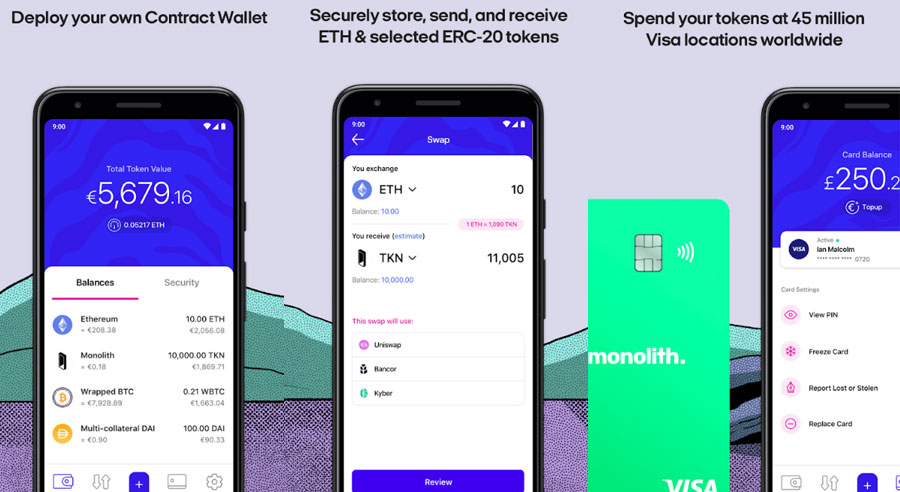
Monolith is essentially providing a bridge between the worlds of crypto and mainstream finance. As well as benefiting users, this is also an encouraging step along the road towards mass adoption.
This service is provided by Paraswap. The only costs incurred are those of the token being bought and Ethereum network fees. If you’re interested in finding out more about this functionality, then Monolith has published a Medium post on the subject which goes into more detail.
Lastly, the Monolith code is entirely open-source, so anyone curious can verify it for themselves or read their external security audits via their Github.
The Card
And so to the meat of this review: the Monolith card itself. One thing that needs to be made clear is that this is not a credit card, but instead, a debit card which you pre-load before you go out and spend. Most crypto cards function in this way, though there are a few – such as Nexo – which offer a credit card-style service.
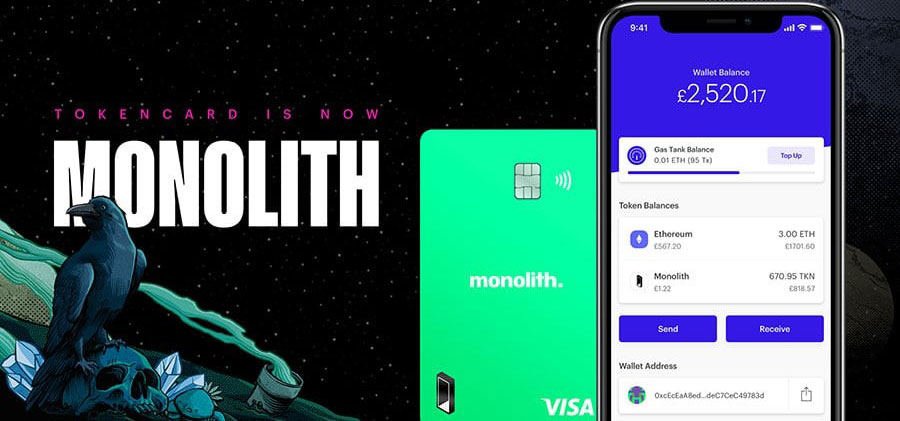
While the wallet itself supports ETH and a whole load of ERC-20 tokens, you can only top the card up with the following:
- Ethereum (ETH)
- Monolith (TKN)
- Dai (DAI)
- DigixDAO (DGD)
- Digix Gold Token (DGX)
- Maker (MKR)
- Single Collateral Dai (SAI)
- Tether (USDT)
Once you’ve uploaded your crypto into the Monolith wallet, you then exchange it for fiat through the app and add it to your card. You’re now all set to go out and spend. This being a Visa-backed card, there’s no shortage of places across the world where you can do this – around 45 million according to Monolith’s website.
One of the most useful features to emerge onto the personal banking scene in the last few years is the ability to track your spending in real time and be able to easily keep tabs on your balance through banking apps.
Fees on Monolith
And so on to the thorny issue of card fees. These vary depending on which crypto card you decide to go for and are a big factor in the decision-making process. Nobody likes to get lumped with extortionate fees for using their card and in some cases, these fees make particular cards barely worth bothering with.
The good news for those considering the Monolith card is that there are no monthly fees, no card shipping fees and no purchase fees if you’re using the card in the country where it’s registered. There’s also no crypto/fiat exchange fee, which Monolith proudly touts as the best rate going.
There is a daily spend limit of £7,500 (€8,113) and a daily cash withdrawal limit of £350 (€378), so all but the biggest spenders should find themselves catered for here. This is also a useful way of minimising losses in the event of a breach, or if the card is stolen.
All that being said, there are some fees to watch out for. If you make a purchase outside of the card’s native currency, then you’ll be hit with a 1.75% fee. Then there’s the card top-up fee: this is 1%, however, if you top up using DAI then you can avoid having to pay this charge.
Rewards
If there’s one area in which the Monolith card falls down it’s that of the rewards on offer if you use the card – or rather, the total lack of any. There are plenty of crypto cards out there offering goodies such as cashback on purchases, or subscriptions to the likes of Spotify and Netflix. The range of cards from crypto.com is especially strong in this regard, while the likes of Nexo and Wirex also offer some decent rewards to their users.
Monolith, on the other hand, seems to have decided against offering anything in this regard for now. This doesn’t make it unique among crypto card providers, but you have to wonder whether it’s something we’re likely to see in the future as the sector becomes more crowded and competitive.
Safety
We’ve seen that the non-custodial, decentralised nature of the Monolith setup means that your crypto is well protected, with only you knowing the private keys and thus having access. The card itself is also regulated here in the UK by the Financial Conduct Authority (FCA) which should give added peace of mind.
It is not, however, covered by the Financial Services Compensation Scheme (FSCS) which covers losses of up to £85,000 per platform. That said, if Monolith was to go under, its creditors still wouldn’t be able to access your funds without those private keys.
Bottom Line
Monolith is something exceptional in the crypto card sphere. No-one else is offering a platform that allows you to spend Ethereum and other ERC-20 tokens, so if those are big parts of your portfolio then it’s definitely something you should consider. The fact that the Monolith wallet is non-custodial, yet also able to make use of Visa’s worldwide reach is another big plus.
Monolith itself is an exciting company and a well-established player in the emerging DeFi field. Its app and crypto card are great starting points for those dabbling in DeFi for the first time and there’s plenty of room for the platform to expand and grow over the coming years.


